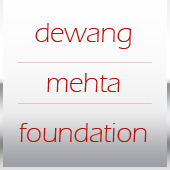He was the man an astonishingly large number of people loved to mock. They mimicked his lisp, gossiped about his hair, carped that his Website www.dewangmehta.com was pretentious, sniggered at his media appearances, scoffed at his tall stories-but boy, did this nobody from Gujarat cock a snook at them by becoming a self-fulfilling prophesy.
He picked himself up from the bootstraps-no godfather, no father, no mother, no siblings, in fact his biggest regret in life was that he had no family left in this world at all-and singly and solely, by sheer dint and perseverance rose to be bigger, better and bolder than all his detractors put together. From a wannabe, eventually, he became the one they wanted to be with. Dewang: you won.
Despite becoming one of India’s most recognized faces-I bet next only to the latest Bollywood heart-throb-within the country as well as abroad and shrugging off the slings and arrows of disbelievers, Dewang was a deeply sensitive person, constantly seeking reassurance that his personal dignity was intact. I can never forget that night twelve years ago, when Dewang was still a journalist-and Nasscom was not even a twinkle in his eyes.
He was assistant editor to my lowly correspondent status and we were working together on a cover story on the Indian IT industry. That night, a sudden scrap erupted between Dewang and another senior colleague-in itself a rarity, because I have never, since heard Dewang raise his voice.
The latter passed a wholly insulting comment in the heat of the moment. Instead of replying in kind, Dewang walked away, but in the privacy of my cabin, sobbed like a child at the hurt that had been inflicted on him. The next day he resigned and swore his journalism days were over.
Some months later he invited me to his new office. It was a dingy, small poky little half-room, which Dewang had tried to cheer up with a mug filled with pens, a giraffe cocktail shaker with a soft koala bear clinging to it, and neatly sharpened pencils. ”I have a vision,” I remember him saying: ”We have set up this association called Nasscom for the software industry and we are going to make India a software superpower. The future for India lies in software.” I yawned and made a mental note to file a story on ”Software lobby splinters away from the Manufacturers Association of Information Technology (MAIT).”
The rest, as we know, is history.
Ironically, the more Dewang rose in the public eye, the more private he became about his personal life. There was no question of loneliness-he once told me that the reason why he wrotes so many columns was because he wanted to ensure he never had a free moment to feel bored or brood over. His ”family” was a faithful retainer who would not only ensure that at all times there was a bag packed with his crisp white shirts and favorite red tie-but would also accompany him for the occasional Hindi movie fix.
But most of all, Dewang loved all things beautiful-and of course, the beautiful life. He knew I never grudged him his success so he would often lower the barriers of ”cool” and chuckle delightedly when he would be caught enjoying la dolce vita: a mobile call that would reveal he was jet-setting in Japan or Sweden; a column faxed on Waldorf Astoria stationary; an anecdote on what he whispered to Bill Gates before introducing him to Laloo Prasad Yadav.
If a lot of people, especially in the early years, felt he talked big-in his Youth Congress days in college for example, he claimed to rub shoulders with Sanjay Gandhi-in the last ten years Dewang outperformed his wildest claims. He did put Indian software on the world map, he did drive the industry from strength to strength, he single-handedly marketed Indian software within the country and abroad, he did make Nasscom the single most-powerful voice for the IT industry, he did hobnob with the best and brightest–from software czars to heads of state to brilliant techies, he did trot around the globe, live in the best hotels, attend the most happening dos, and have a pulse on the global IT gossip.
In that sense, the short life of this torchbearer was not snuffed out too soon-he did more in one brief lifetime, than most people achieve in seven births. Perhaps, the only unfinished item on his agenda was to revisit his first love, politics, to pander to his final love, information technology.
Over a pizza in January this year, when I asked him if he was now ready to leave Nasscom and pitch to become the next IT minister, he didn’t laugh away the suggestion as usual. Instead, he admitted, he now wanted to be Prime Minister, as only then could he drive IT policy in such a way that India became a superpower. He was so serious, that I bit back my disbelief: with Dewang you could never tell how far his evangelism/ambition could take him.
One thing I’m sure of: wherever he is, he has no regrets and he will read this obit with quiet pride. Here’s why I know. Within hours of the Gujarat quake, Dewang was on a flight to rush assistance to his native land. At a village near Anjar, he told me, he came across a 10-year-old injured boy huddled in the rubble. The boy suddenly reached out to grab Dewang and said: ”Aren’t you Dewang Mehta?” Dewang was taken aback. The child sobbed: ”I’ve seen you many times on TV and used to tell my parents that I want to be like you when I grow up. But they are dead now.” Dewang hugged the boy and brought him back to Delhi and later told me, that he will never forget those words. Dewang: you won. How many of us, after all is dead and gone, can claim to be role-models?


